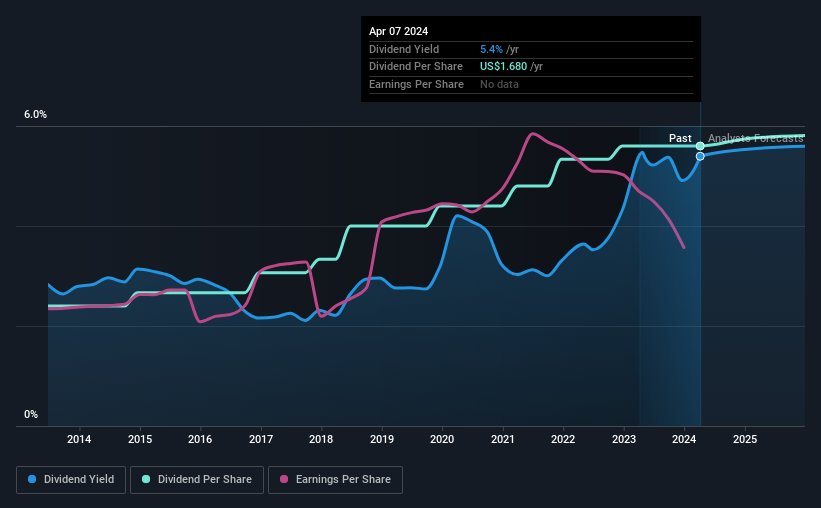We Wouldn't Be Too Quick To Buy Camden National Corporation (NASDAQ:CAC) Before It Goes Ex-Dividend
Regular readers will know that we love our dividends at Simply Wall St, which is why it's exciting to see Camden National Corporation (NASDAQ:CAC) is about to trade ex-dividend in the next four days. The ex-dividend date occurs one day before the record date which is the day on which shareholders need to be on the company's books in order to receive a dividend. It is important to be aware of the ex-dividend date because any trade on the stock needs to have been settled on or before the record date. Therefore, if you purchase Camden National's shares on or after the 12th of April, you won't be eligible to receive the dividend, when it is paid on the 30th of April.
The company's next dividend payment will be US$0.42 per share, and in the last 12 months, the company paid a total of US$1.68 per share. Last year's total dividend payments show that Camden National has a trailing yield of 5.4% on the current share price of US$31.14. Dividends are an important source of income to many shareholders, but the health of the business is crucial to maintaining those dividends. That's why we should always check whether the dividend payments appear sustainable, and if the company is growing.
View our latest analysis for Camden National
Dividends are usually paid out of company profits, so if a company pays out more than it earned then its dividend is usually at greater risk of being cut. Camden National paid out 56% of its earnings to investors last year, a normal payout level for most businesses.
When a company paid out less in dividends than it earned in profit, this generally suggests its dividend is affordable. The lower the % of its profit that it pays out, the greater the margin of safety for the dividend if the business enters a downturn.
Click here to see the company's payout ratio, plus analyst estimates of its future dividends.
Have Earnings And Dividends Been Growing?
Companies with falling earnings are riskier for dividend shareholders. Investors love dividends, so if earnings fall and the dividend is reduced, expect a stock to be sold off heavily at the same time. That's why it's not ideal to see Camden National's earnings per share have been shrinking at 2.7% a year over the previous five years.
Many investors will assess a company's dividend performance by evaluating how much the dividend payments have changed over time. Camden National has delivered an average of 8.8% per year annual increase in its dividend, based on the past 10 years of dividend payments. Growing the dividend payout ratio while earnings are declining can deliver nice returns for a while, but it's always worth checking for when the company can't increase the payout ratio any more - because then the music stops.
To Sum It Up
From a dividend perspective, should investors buy or avoid Camden National? We're not overly enthused to see Camden National's earnings in retreat at the same time as the company is paying out more than half of its earnings as dividends to shareholders. Camden National doesn't appear to have a lot going for it, and we're not inclined to take a risk on owning it for the dividend.
Curious what other investors think of Camden National? See what analysts are forecasting, with this visualisation of its historical and future estimated earnings and cash flow.
A common investing mistake is buying the first interesting stock you see. Here you can find a full list of high-yield dividend stocks.
Have feedback on this article? Concerned about the content? Get in touch with us directly. Alternatively, email editorial-team (at) simplywallst.com.
This article by Simply Wall St is general in nature. We provide commentary based on historical data and analyst forecasts only using an unbiased methodology and our articles are not intended to be financial advice. It does not constitute a recommendation to buy or sell any stock, and does not take account of your objectives, or your financial situation. We aim to bring you long-term focused analysis driven by fundamental data. Note that our analysis may not factor in the latest price-sensitive company announcements or qualitative material. Simply Wall St has no position in any stocks mentioned.

 Yahoo Finance
Yahoo Finance 
